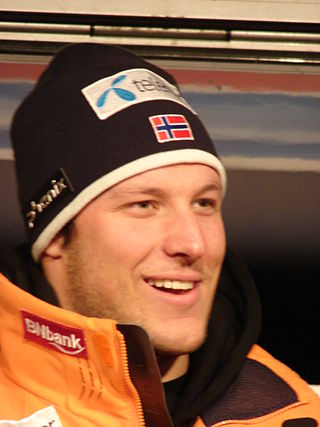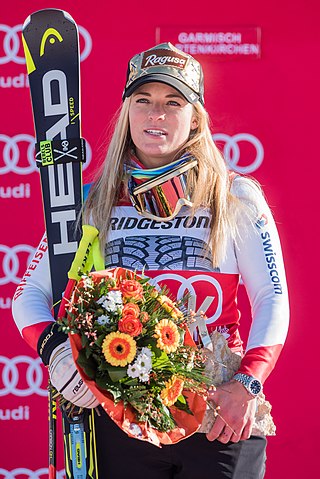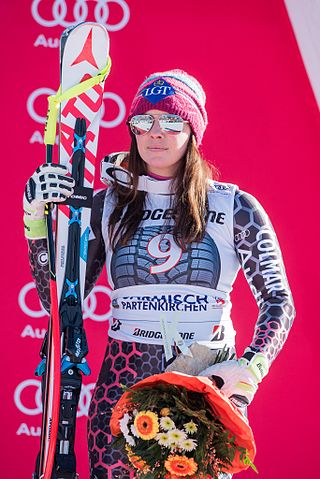
The 43rd World Cup season began in late October 2008 in Sölden, Austria, and concluded in mid-March 2009, at the World Cup finals in Åre, Sweden.

The 49th World Cup season began on 25 October 2014, in Sölden, Austria, and concluded on 22 March 2015 at the World Cup finals in Meribel, France. The defending overall champions from the 2014 season - Marcel Hirscher and Anna Fenninger, both of Austria, defended their titles successfully. The season was interrupted by the World Championships in February, in the United States at Vail/Beaver Creek, Colorado. Combined events were not awarded as a discipline trophy.

The International Ski Federation (FIS) Alpine Ski World Cup, the premier circuit for alpine skiing competition, began in January 1967, and the 2019–20 season marked the 54th consecutive year for the FIS World Cup. As it had every year since 2006, the season began in Sölden, Austria in October. The season was supposed to end with the World Cup finals in March, which were to be held in Cortina d'Ampezzo, Italy for the first time since they began in 1993, but the finals were cancelled due to the COVID-19 outbreak in Italy.

The International Ski Federation (FIS) Alpine Ski World Cup was the premier circuit for alpine skiing competition. The inaugural season launched in January 1967, and the 2020–21 season marked the 55th consecutive year for the FIS World Cup. As it had every year since 2006, the season began in Sölden, Austria in October, and it ended with the World Cup finals in March, which were held in Lenzerheide, Switzerland. However, the COVID-19 pandemic forced many changes to the original racing schedule. Among them were the following:

The women's super-G in the 2021 FIS Alpine Skiing World Cup consisted of 6 events, with one cancellation from the scheduled seven. Swiss skier Lara Gut-Behrami won four of the first five Super-Gs to establish an 195-point lead over Swiss teammate and defending discipline champion Corinne Suter with only two races to go, and she clinched the discipline title for 2021 after the sixth event, which turned out to be the last one for the season.

The men's downhill in the 2021 FIS Alpine Skiing World Cup consisted of seven events. The original schedule had contained nine downhills, but a rescheduled one on 5 March in Saalbach-Hinterglemm, Austria, was canceled due to fog and continual snowfall after just nine skiers had finished, and the downhill during World Cup finals week was also canceled.

The men's downhill in the 2020 FIS Alpine Skiing World Cup consisted of nine events, with only one cancellation from the scheduled ten.

The International Ski Federation (FIS) Alpine Ski World Cup was the premier circuit for alpine skiing competition. The inaugural season launched in January 1967, and the 2021–22 season marked the 56th consecutive year for the FIS World Cup.

The women's downhill in the 2022 FIS Alpine Skiing World Cup consisted of nine events including the finals. Defending champion Sofia Goggia of Italy, who won four of the five downhills in which she competed in 2020-21, continued her domination in 2021-22 by again winning four of the first five downhills. Goggia took a commanding lead in the discipline after American Breezy Johnson, who finished second in each of the first three downhills, missed the rest of the season with a knee injury. Goggia then suffered her own knee injury, including a broken bone and ligament tears, while training for the last downhill prior to the 2022 Winter Olympics, but she was able to continue competing within a month and, after all but the final race of the season, had such a commanding lead that only one other competitor even had a theoretical possibility of overtaking her. At the finals, Suter failed to score, and Goggia won her second consecutive discipline championship.

The men's downhill in the 2022 FIS Alpine Skiing World Cup included eleven events including the final. A scheduled downhill on 5 December 2021 at Beaver Creek, Colorado was cancelled due to bad weather, but after several abortive attempts to run it at other venues, it was finally added to Kvitfjell on March 4, the day before the previously-scheduled race.

The men's slalom in the 2022 FIS Alpine Skiing World Cup consisted of ten events including the final. However, the slalom scheduled in Zagreb on 5 January was first delayed until 6 January due to bad weather and then cancelled in the middle of the first run due to additional bad weather, leading to its removal from the schedule. Eventually, however, it was rescheduled for Flachau on 9 March, restoring the season to 10 events.

The International Ski Federation (FIS) Alpine Ski World Cup was the premier circuit for alpine skiing competition. The inaugural season launched in January 1967, and the 2022–23 season marks the 57th consecutive year for the FIS World Cup.

The men's downhill in the 2023 FIS Alpine Skiing World Cup consisted of ten events, including the final. The season had been planned with fourteen downhills, but early in the season, two scheduled downhills on 29/30 October 2022 on the Matterhorn, running from Switzerland (Zermatt) into Italy (Cervinia), were canceled due to lack of snow and not rescheduled. Later in the season, a downhill scheduled for Garmisch-Partenkirchen on 28 January 2023 was also cancelled for lack of snow and not rescheduled. Finally, on 3 March, a scheduled downhill at Aspen was canceled due to poor visibility and deteriorating weather conditions, even though 24 racers had already started. The first out of the starting gate, Norway's Adrian Smiseth Sejersted, held the lead and was hoping for six more competitors to start so that the race would become official, but the weather conditions prevented that.

The women's downhill in the 2018 FIS Alpine Skiing World Cup involved eight events, including the season finale in Åre, Sweden. Before the start of the season, defending discipline champion Ilka Štuhec of Slovakia suffered a season-ending injury. Ultimately, the discipline title ended up as a battle between oft-injured eight-time discipline champion Lindsey Vonn of the USA and rising Italian skier Sofia Goggia. Through five races, Goggia had a 63-point lead over Vonn, who had been hampered with an injury at the start of the season. Vonn won all of the last three races, earning 300 points. .. but Goggia finished second in all three, earning 240 points, to hang on to a three-point victory for the season title.

The men's downhill in the 2018 FIS Alpine Skiing World Cup involved nine events, including the season finale in Åre, Sweden. Swiss skier Beat Feuz ended the two-season reign of Italy's Peter Fill and won the season title in this discipline after a season-long battle with former discipline champion Aksel Lund Svindal of Norway.

The women's downhill in the 2017 FIS Alpine Skiing World Cup involved eight events, including the season finale in Aspen, Colorado (USA). Defending champion Lindsey Vonn of the USA was injured during the first half of the season, leaving the championship race wide open. However, Slovenian skier Ilka Štuhec won the first three downhills of the season and ended up carrying a 97-point lead into the finals, meaning that all she needed was either to finish in the top 15 herself or for rising Italian skier Sofia Goggia, who was in second, not to win. As it turned out, Štuhec won the final herself, clinching the discipline title.

The women's super-G in the 2017 FIS Alpine Skiing World Cup involved seven events, including the season final in Aspen, Colorado (USA). Defending discipline champion Lara Gut from Switzerland got off to a great start by winning the first three races, but she suffered a season-ending injury in early February, which led to a tight battle between the two top contenders remaining: Slovenia's Ilka Štuhec and Liechtenstein's Tina Weirather. With just the season finals in Aspen remaining, Štuhec, who had won two races in the discipline and won the season title in the downhill the day before the race, held a 15-point lead over Weirather, but Weirather nipped Štuhec by 0.35 seconds in the finals, giving her the season title by 5 points.

The men's super-G in the 2017 Alpine Skiing World Cup involved six events, including the finals in Aspen, Colorado (USA). Although Norwegian skier Aleksander Aamodt Kilde was the defending champion in the discipline, fellow Norwegian Kjetil Jansrud won the first three Super-G races of the season. With only six events in the discipline, Jansrud then clinched the season championship before the finals merely by finishing seventh in the fifth Super-G of the year in Kvitfjell, Norway.

The men's giant slalom in the 2017 FIS Alpine Skiing World Cup involved nine events, including the second-ever parallel giant slalom and the season finals in Aspen, Colorado (USA). Marcel Hirscher of Austria won four of the races this season and finished second in four others, easily winning the discipline for the third straight season on his way to his sixth straight overall World Cup championship. Hirscher was so dominant during the season that much of the focus in the news coverage by the end of the season was about his desire to continue, considering the pressure on him to win.

The men's downhill competition in the 2016 FIS Alpine Skiing World Cup involved eleven events, including the season finale in St. Moritz, Switzerland.















